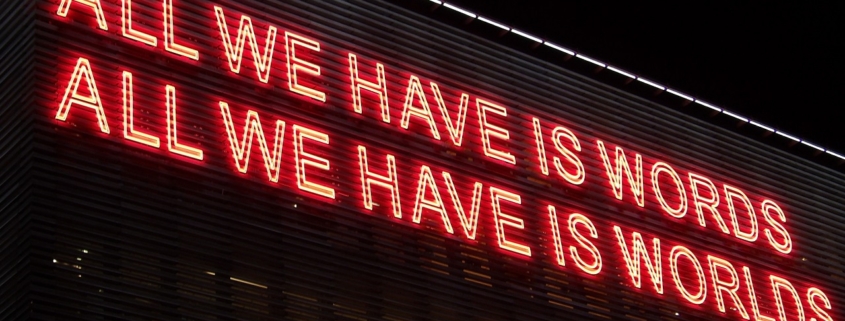We started with an acknowledgement of wind
We started with an acknowledgement of wind
By Ariana Malthaner
I have always been obsessed with words. Whether it was voraciously absorbing them through the endless stream of library books that passed through my greedy hands, or the way they poured from pen onto the page and eventually from the keyboard onto the screen, I was always obsessed with words. Ultimately, my obsession led me to the study of minority languages, of the near-forgotten tongues of ancient people whose words would have been lost were it not for our attempts to preserve and keep them. My studies focused on the mechanical aspects of words, using clinical-sounding terminology to dissect and discuss the ways in which words are created, formed and performed.
Although gratifying to have the answers, to understand the mechanics and inner workings of language, sometimes it is easy to lose sight of what it so wonderful about words.
Catherine Tammaro’s introduction to the ASO Convergence, our acknowledgement of wind and the way that wind creates words was grounding, shifting the focus in my mind back from aspects like morphology and phonology and towards the more human aspect of language, and the creation of words.
Words have been the centre of my world for a long time, but the words themselves have gotten lost in the myriad of other elements that have occupied my time and my mind, just as the fact that art can be lost in the work of ASOs when trying to navigate the daily minutia of the job. So much of our time, as those who work in arts service organisations, is occupied with administration, concerns over funding and endless lists of things that need to be done.
An underlying theme of the convergence, although barely articulated explicitly, was the feeling that there is inherent difficulty in trying to reconcile art and the mission of art services organisations with the capitalist, colonist structures under which we are all forced to operate.
As someone relatively new to the world of arts service, I don’t yet feel as though I can fully speak to these experiences, but over and over I heard colleagues from other organisations speak of the incredible work that they’re doing, and the important things they wish they could be doing, and the hurdles that they are endlessly having to overtake just to complete the work they do.
So much of the discussion in the sessions I was fortunate to attend revolved around the struggles and the difficulties of securing the funding that we need, the limitations of our organisations on account of the systems that are currently in place and the inability to complete the work that we wish we could do because we’re forced to overextend ourselves and overburden our capacities to meet the requirements put in place for us by the systems we serve – that are, ostensibly, meant to serve us.
These discussions and these difficulties really highlighted the need for unity among ASOs – not just because there is so much time and energy and resources expended on projects that are unknowingly being replicated across the country, and sometimes even within the same province, but because we are not our own islands. We share common goals, we grapple with the same difficulties, we serve similar communities – and sometimes even share our communities with other ASOs – and the future of art service organisations could look incredibly different if we were to collaborate and to better work together moving forward; perhaps if we were to collectively advocate for a radical overhaul of current systems, we would better be able to achieve the outcomes we want.
MASS Culture and their work has been an incredible step towards this future, and bringing everyone together in a shared space was a brilliant way for us to forge connections and begin collaborations that will undoubtedly serve us well in the future, for the betterment of our organisations and the communities that we serve.
To read the magazine pdf format, click here


